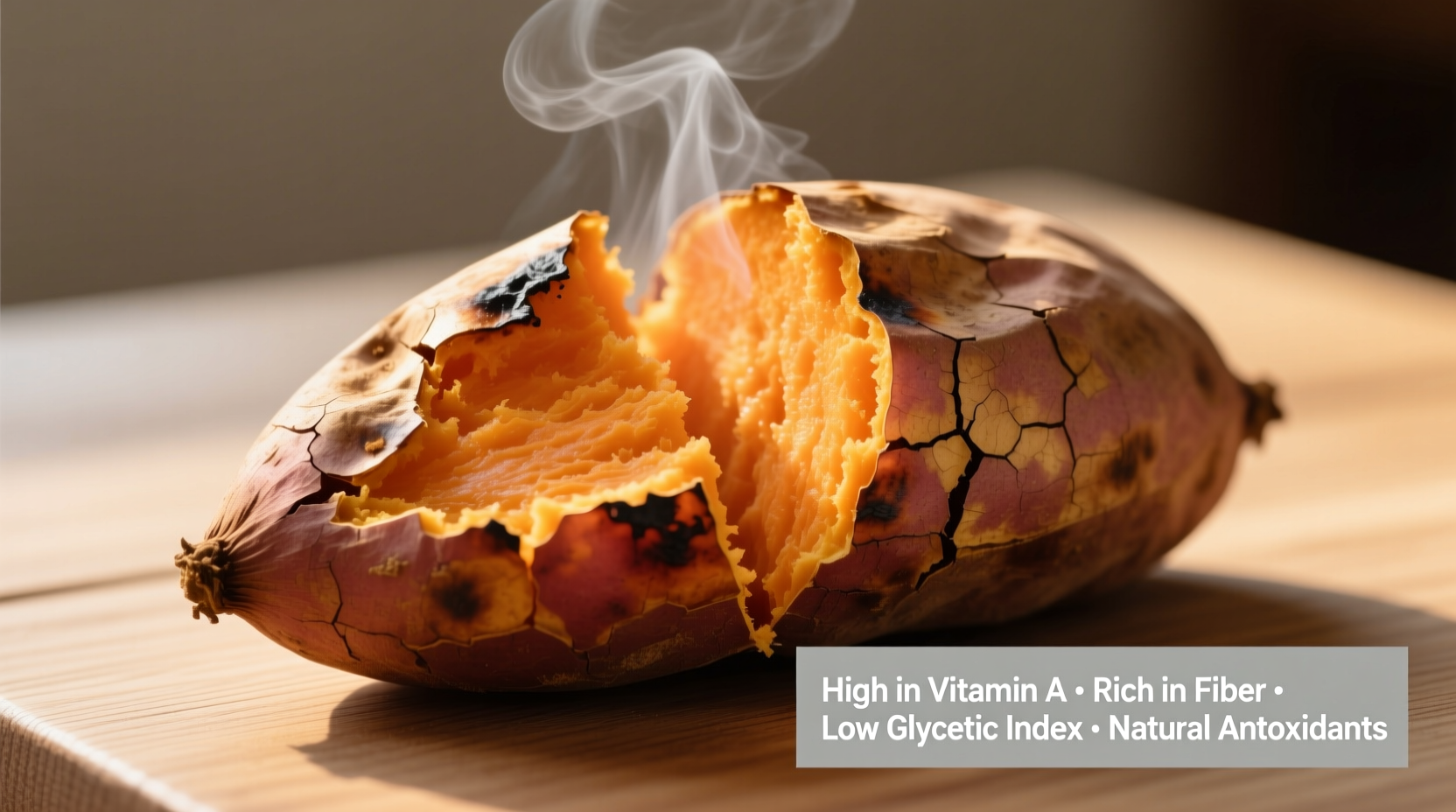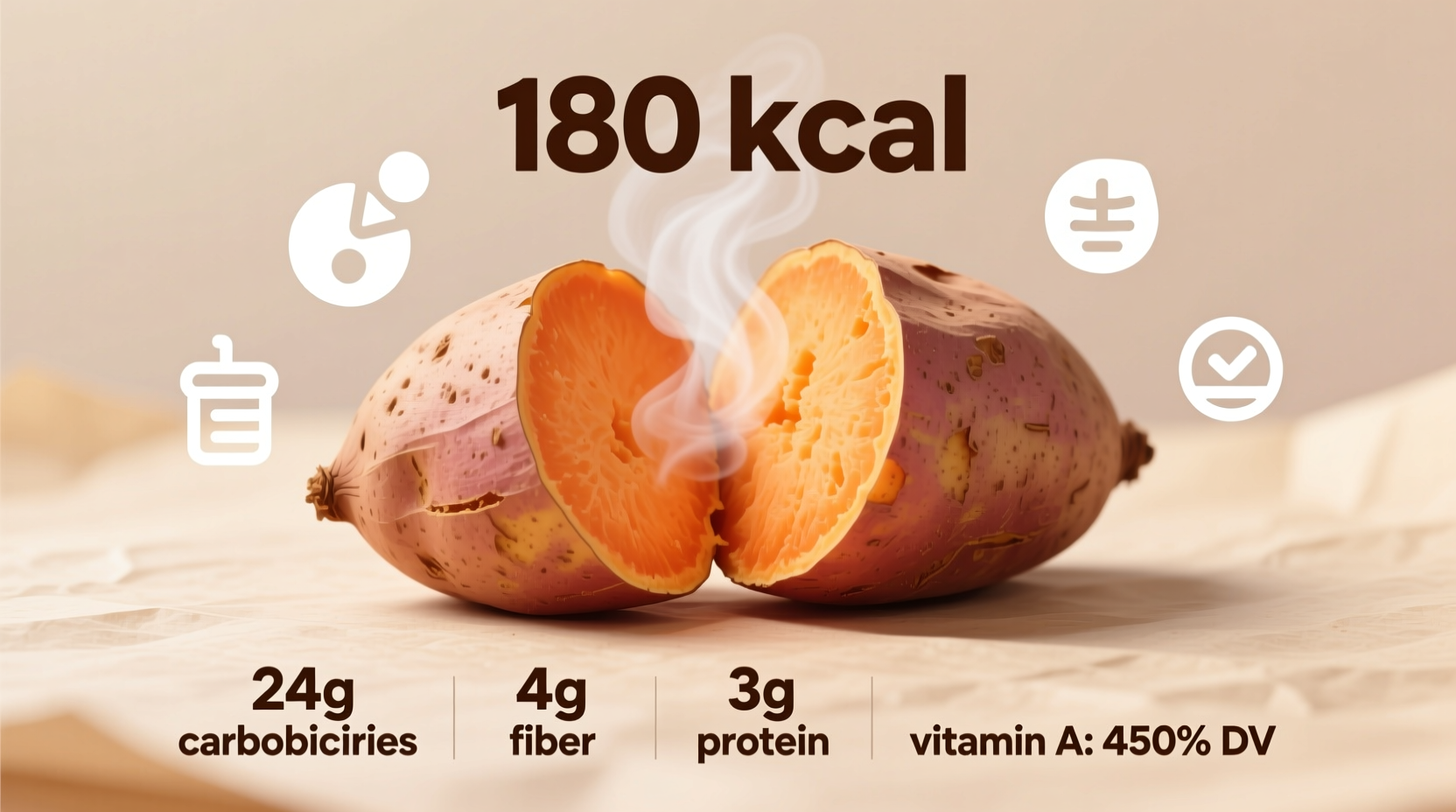A medium-sized sweet potato (approximately 130g) contains 103 calories when baked with skin. This nutrient-dense root vegetable provides essential vitamins, fiber, and antioxidants while remaining a smart choice for balanced nutrition.
Understanding the exact calorie content of sweet potatoes helps you make informed dietary choices without sacrificing flavor or nutrition. Whether you're managing weight, tracking macros, or simply eating healthier, knowing how preparation methods affect calorie counts empowers you to enjoy this versatile vegetable in the most beneficial way.
Nutritional Profile Beyond Calories
Sweet potatoes aren't just about calorie count—they're nutritional powerhouses. One medium sweet potato delivers remarkable health benefits that extend far beyond its modest calorie footprint. Let's examine what makes this humble vegetable so valuable to your diet.
| Nutrient | Amount per Medium Sweet Potato (130g) | Daily Value % |
|---|---|---|
| Calories | 103 | 5% |
| Vitamin A (as beta-carotene) | 21,907 IU | 438% |
| Vitamin C | 22.3 mg | 25% |
| Fiber | 3.6 g | 14% |
| Potassium | 475 mg | 14% |
| Manganese | 0.6 mg | 28% |
Source: USDA FoodData Central, Release 1.01 (2023)
This impressive nutritional profile explains why sweet potatoes have been a dietary staple across cultures for centuries. The high beta-carotene content converts to vitamin A in your body, supporting vision, immune function, and skin health. Unlike many starchy vegetables, sweet potatoes have a low glycemic load when prepared properly, making them suitable for most dietary approaches.
How Preparation Methods Change Calorie Content
Your cooking technique significantly impacts the final calorie count of sweet potatoes. Understanding these variations helps you maintain control over your nutritional intake while enjoying this versatile vegetable.
Baking with skin preserves the most nutrients while keeping calories at their baseline level of 103 per medium potato. The skin contains additional fiber and nutrients, so leaving it on provides maximum benefit. According to research from the Centers for Disease Control and Prevention, cooking methods that require little to no added fat help maintain the vegetable's natural nutritional advantages.
Boiling results in slightly fewer calories (about 90 per medium potato) as some starch leaches into the water. However, this method also causes some nutrient loss, particularly water-soluble vitamins like vitamin C.
Frying or adding fats substantially increases calorie content:
- With one tablespoon of butter: +102 calories (total 205)
- Deep-fried sweet potato fries (1 cup): 300-400 calories
- Sweet potato casserole with marshmallows: 350+ calories per serving
This context boundary matters significantly for those tracking calorie intake. The vegetable itself remains nutritious, but preparation choices determine whether it fits within specific dietary goals.
Sweet Potato vs. Regular Potato: Nutritional Comparison
When deciding between sweet potatoes and regular white potatoes, understanding their nutritional differences helps you make the best choice for your health goals.
| Nutrient | Sweet Potato (130g) | White Potato (138g) |
|---|---|---|
| Calories | 103 | 110 |
| Vitamin A | 438% DV | 0% DV |
| Vitamin C | 25% DV | 20% DV |
| Fiber | 3.6g | 2.3g |
| Glycemic Index | 44 (medium) | 78 (high) |
Source: USDA FoodData Central
While both are nutritious, sweet potatoes provide dramatically more vitamin A and fiber while having a lower glycemic index. This makes them a better choice for blood sugar management and overall nutrient density. The historical evolution of sweet potato cultivation shows why they've become increasingly popular in modern nutrition planning—they offer superior micronutrient content compared to many other staple carbohydrates.
Health Benefits Backed by Research
Beyond their impressive vitamin profile, sweet potatoes deliver specific health benefits supported by scientific research. The vibrant orange color comes from beta-carotene, a powerful antioxidant that converts to vitamin A in your body.
According to a National Institutes of Health study, diets rich in beta-carotene may reduce the risk of certain chronic diseases. The high fiber content (3.6 grams per medium potato) supports digestive health and promotes feelings of fullness, which can aid in weight management.
Emerging research from Harvard T.H. Chan School of Public Health suggests that the specific type of carbohydrates in sweet potatoes may help regulate blood sugar levels better than many other starchy foods, making them a smart choice for those monitoring glucose levels.

Practical Ways to Enjoy Sweet Potatoes
Incorporating sweet potatoes into your diet doesn't require complicated recipes or special equipment. Here are practical, calorie-conscious preparation methods that maximize nutritional benefits:
- Simple baked sweet potato: Pierce skin with a fork, bake at 400°F for 45-60 minutes. No added fats needed.
- Healthy sweet potato fries: Cut into wedges, toss with 1 tsp olive oil per potato, bake at 425°F for 25 minutes.
- Breakfast option: Mash cooked sweet potato with cinnamon for a nutrient-dense alternative to toast.
- Salad booster: Add cooled, cubed sweet potato to green salads for sustained energy.
These preparation methods maintain the natural calorie count while enhancing flavor through spices rather than added fats. For those following specific dietary patterns, sweet potatoes fit well within Mediterranean, vegetarian, and balanced omnivore approaches.
When Sweet Potatoes Fit Your Dietary Goals
Sweet potatoes work well in various eating patterns, but understanding their role in different dietary approaches helps you maximize benefits:
- Weight management: Their high fiber content promotes satiety. Stick to 1 medium potato (103 calories) as a carbohydrate source.
- Diabetes management: Pair with protein and healthy fats to moderate blood sugar response.
- Athletic performance: Consume before workouts for sustained energy release.
- General wellness: Enjoy regularly for vitamin A benefits supporting immune function.
Registered dietitians often recommend sweet potatoes as a "nutrient amplifier"—a food that significantly boosts the nutritional quality of meals without excessive calories. Their versatility makes them suitable for most dietary patterns when portion sizes align with individual energy needs.
Frequently Asked Questions
How many calories are in a small sweet potato?
A small sweet potato (about 100g) contains approximately 86 calories when baked with skin. This provides about 340% of your daily vitamin A needs while remaining a moderate carbohydrate source.
Do sweet potatoes have more calories than white potatoes?
Sweet potatoes and white potatoes have similar calorie counts per serving (103 vs 110 calories for medium sizes), but sweet potatoes provide significantly more vitamin A, fiber, and antioxidants. The glycemic index of sweet potatoes is lower, making them a better choice for blood sugar management.
Are sweet potatoes good for weight loss?
Yes, sweet potatoes can support weight loss when consumed in appropriate portions. Their high fiber content (3.6g per medium potato) promotes fullness, and their nutrient density means you get substantial vitamins and minerals for relatively few calories. Avoid adding high-calorie toppings like marshmallows or excessive butter to keep them weight-loss friendly.
Does boiling sweet potatoes reduce calories?
Boiling slightly reduces calorie content (to about 90 calories for a medium sweet potato) as some starch leaches into the water. However, this method also causes some nutrient loss, particularly water-soluble vitamins. For maximum nutrient retention, baking or steaming is preferable to boiling.
How many sweet potatoes can I eat per day?
Most nutrition experts recommend 1 medium sweet potato (about 130g) per day as part of a balanced diet. This provides excellent nutrient benefits without excessive carbohydrate intake. Those managing blood sugar may want to pair it with protein and healthy fats, while active individuals might include slightly larger portions to support energy needs.











 浙公网安备
33010002000092号
浙公网安备
33010002000092号 浙B2-20120091-4
浙B2-20120091-4